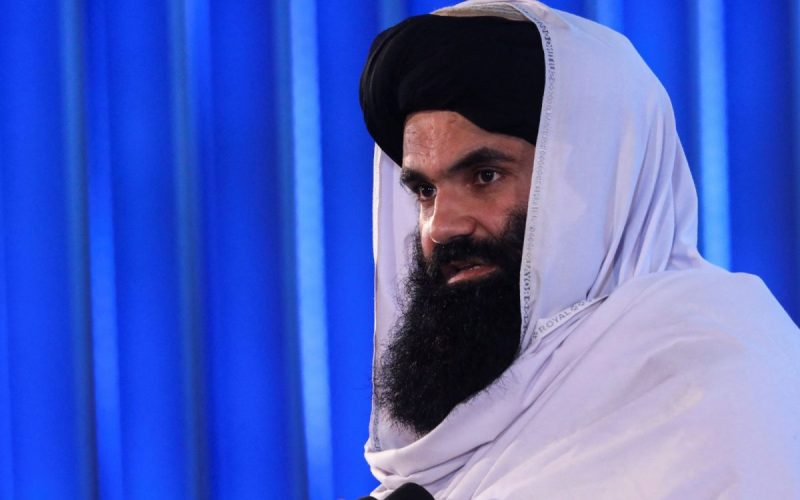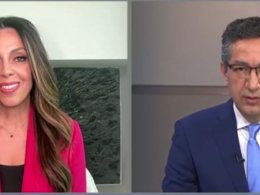It now appears that the Afghan home where the Al-Qaeda operative who was recently killed in a United States strike was hiding out, allegedly belonged to an FBI-wanted Taliban official who once received a platform by the New York Times to write an op-ed, "What We, the Taliban, Want," according to intelligence reports.
The U.S. targeted Ayman al-Zawahiri, al-Qaeda’s second-in-command to Osama bin Laden who then took leadership of the group after his passing, as he was standing on the balcony of his safe house in Afghanistan, sheltered by Sirajuddin Haqqani, who had already surfaced as a public figure among Taliban officials when he made his debut in one of the most popular mainstream newspapers.
Haqqani, who heads the terrorist Haqqani network linked to terrorist attacks against Americans, wrote an opinion editorial in 2020, causing outrage among many lawmakers and national security experts, given that the piece allowed Haqqani to openly and freely spread propaganda and lies about the Taliban.
When the New York Times published Haqqani's opinion piece in 2020, the leader of the insurgent Haqqani Network in Afghanistan laid out demands to the U.S. and Afghan leaders, including a peace agreement that would allow the Taliban to have control in the country. Reporters at the New York Times were outraged by the outlet's actions, taking to social media to protest the decision, arguing that Haqqani's background as a high-ranking Taliban official should disqualify him immediately.
Throughout his piece, Haqqani painted an idyllic picture of a "new Afghanistan," free from Western "domination" while failing to mention all the attacks, deaths, and human rights violations.
“I would be surprised to see the NYT change its policy that permits dictators and terrorist from promulgating their vitriol in editorials. I can only speculate that the Times sees itself as a publication open to having diverse opinions expressed even when those opinions stem from individuals whose very words and action promote hatred and attack the U.S. and its values of liberty and Justice for all,” retired U.S. intelligence officer David R. Shedd said to The Foreign Desk.
For its part, the New York Times defended its printing of Haqqani's arguments with a spokesperson stating that the newspaper took into consideration all the Taliban's dangerous and destructive comments, but argued that the mission of the Times Opinion is to "tackle extensive ideas from a range of newsworthy viewpoints."
The explanation from the Times raised eyebrows from many journalists, with some stating that the newspaper had to draw a line and use alternatives other than actual terrorist groups or individuals to discuss prominent issues.
Now the New York Times is being accused by many on social media and other outlets of "stealth-editing" their reporting on the killing of al-Zawahiri, removing key details of initial reports naming Haqqani.
On Twitter, Arkansas Senator Tom Cotton, whose op-ed against rioting and looting in the 2020 BLM protests led the New York Times to pull down his piece, commented on the recent revelations stating that the Times needed to "improve its process for accepting op-eds."
Other experts and foreign policy analysts also took to Twitter to lay criticism against the Times and outline the lies made by Haqqani on Taliban governance.
"The issue, to me, is whether the U.S. government should attempt to stop/sanction an American media outlet from publishing or airing a terrorist's propaganda. My response is unequivocal: I do not believe the U.S. government should get involved in directing any media outlet what it can print, air, or show. I believe readers, listeners, and viewers of media should challenge the outlet for using poor judgment and promoting hate and discord," explained Shedd.
Shedd, like many other experts, lawmakers, and journalists, believes that the newspaper outlet should apologize but has "no confidence it will do so." Instead, what many believe will happen in the coming days it the New York Times will "continue to stand by their 'right to publish' dissenting opinion pieces even if crafted by the individual(s) that provided Zawahiri safe harbor in Kabul," Shedd said.
After pulling all American troops out of Afghanistan in 2021, President Biden claimed that the decision would not harm American security at home or abroad and declared that Al Qaeda would not remerge in the country. Once the new Taliban came into power, they established a radical-Islamic Sharia-based government that enacted oppressive laws against Afghan men, women, and children. The Taliban government has also upgraded its military capabilities with American military equipment left behind by the Biden administration in its pullout efforts.
Of the many concerns about the administration's actions, lawmakers and national security experts were deeply concerned that Al-Qaeda could remerge in Afghanistan and use the country as a haven for future terrorist attacks against Americans and allies. The recent targeting of Al-Qaeda's top leader has led many to conclude that the Taliban are allowing Al-Qaeda to have a haven in Afghanistan, helping the group to hide its top leadership and plan terrorist attacks against Americans. Asked whether the President and the Secretary of State were wrong about Al-Qaeda's presence in Afghanistan, spokesperson John Kirby deflected the question from reporters.
"Zawahiri's unconstrained presence in Kabul strongly suggests that while American intelligence could ostensibly identify this high-value target, how many lower-level terrorists are being given sanctuary in Afghanistan will go undetected? Shedd posed the question.
“The answer is clear: many will operate and potentially plan future terrorist attacks from a location that, after August 30, 2021, provided enormous leeway for the reconstitution of international terrorists inside Afghanistan."










